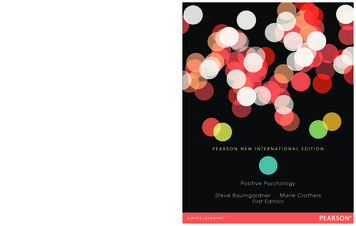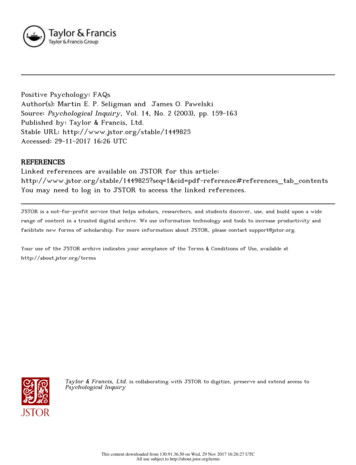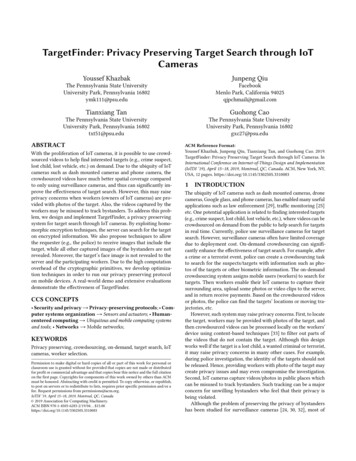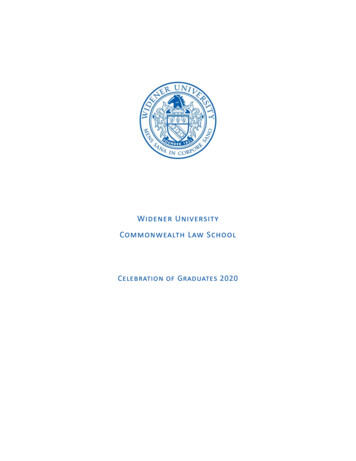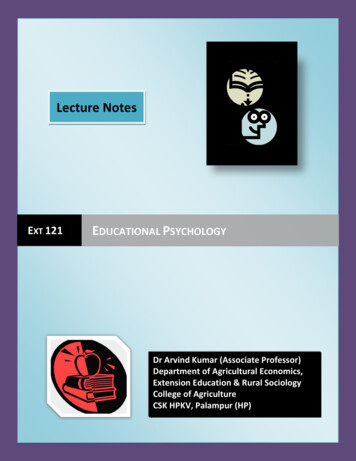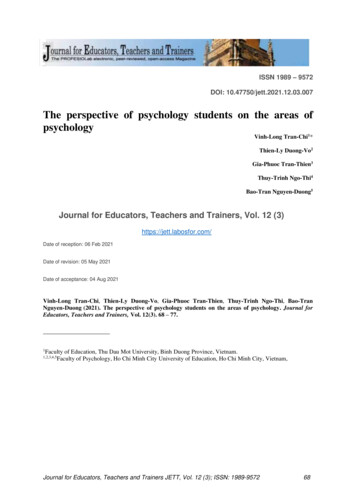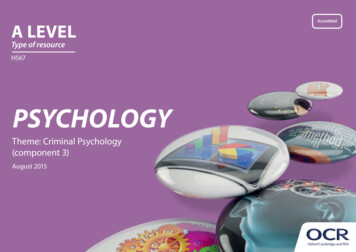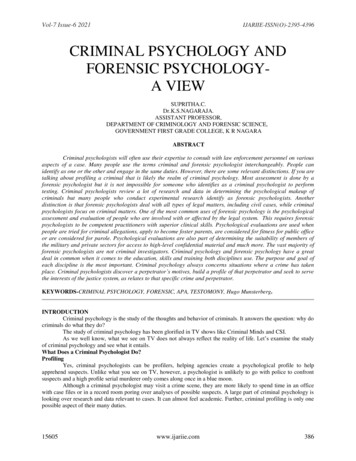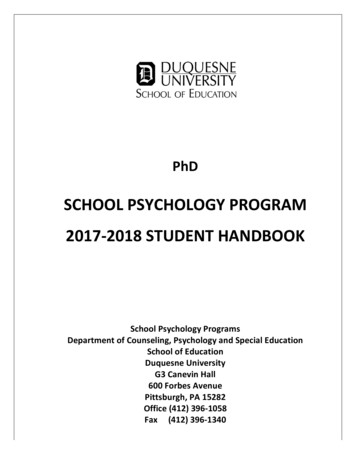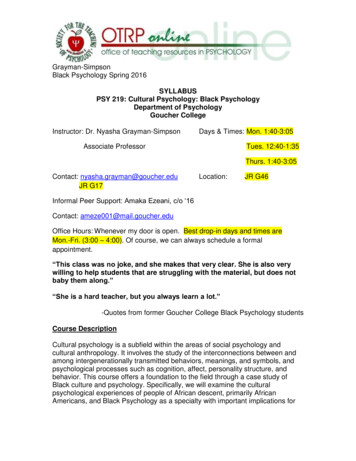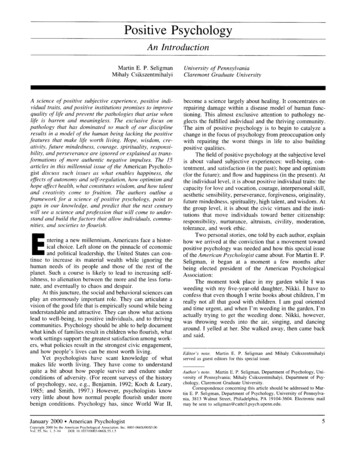
Transcription
Positive PsychologyAn IntroductionMartin E. P. SeligmanMihaly CsikszentmihalyiA science of positive subjective experience, positive individual traits, and positive institutions promises to improvequali .' of life and prevent the pathologies that arise whenlife is barren and meaningless. The exclusive focus onpathology that has dominated so much of our disciplineresults in a model of the human being lacking the positivefeatures that make life worth living. Hope, wisdom, creativity, future mindedness, courage, spirituality, responsibility, and perseverance are ignored or explained as transformations of more authentic negative impulses. The 15articles in this millennial issue of the American Psychologist discuss such issues as what enables happiness, theeffects of autonomy and self-regulation, how optimism andhope affect health, what constitutes wisdom, and how talentand creativity come to fruition. The authors outline aframework .['or a science of positive psychology, point togaps in our knowledge, and predict that the next centurywill see a science and profession that will come to understand and build the factors that allow individuals, communities, and societies to flourish.Entering a new millennium, Americans face a historical choice. Left alone on the pinnacle of economicand political leadership, the United States can continue to increase its material wealth while ignoring thehuman needs of its people and those of the rest of theplanet. Such a course is likely to lead to increasing selfishness, to alienation between the more and the less fortunate, and eventually to chaos and despair.At this juncture, the social and behavioral sciences canplay an enormously important role. They can articulate avision of the good life that is empirically sound while beingunderstandable and attractive. They can show what actionslead to well-being, to positive individuals, and to thrivingcommunities. Psychology should be able to help documentwhat kinds of families result in children who flourish, whatwork settings support the greatest satisfaction among workers, what policies result in the strongest civic engagement,and how people's lives can be most worth living.Yet psychologists have scant knowledge of whatmakes life worth living. They have come to understandquite a bit about bow people survive and endure underconditions of adversity. (For recent surveys of the historyof psychology, see, e.g., Benjamin, 1992; Koch & Leary,1985; and Smith, 1997.) However, psychologists knowvery little about how normal people flourish under morebenign conditions. Psychology has, since World War II,rJanuary 2000 American PsychologistCopyright2000 by the AmericanPsychologicalAssociation.lnc. 0003-066X/00/ 5.00Voh 55. No. 1. 5 14 DOI: 10.1037//0003-066X.55.1.5University of PennsylvaniaClaremont Graduate Universitybecome a science largely about healing. It concentrates onrepairing damage within a disease model of human functioning. This almost exclusive attention to pathology neglects the fulfilled individual and the thriving community.The aim of positive psychology is to begin to catalyze achange in the focus of psychology from preoccupation onlywith repairing the worst things in life to also buildingpositive qualities.The field of positive psychology at the subjective levelis about valued subjective experiences: well-being, contentment, and satisfaction (in the past); hope and optimism(for the future); and flow and happiness (in the present). Atthe individual level, it is about positive individual traits: thecapacity for love and vocation, courage, interpersonal skill,aesthetic sensibility, perseverance, forgiveness, originality,future mindedness, spirituality, high talent, and wisdom. Atthe group level, it is about the civic virtues and the institutions that move individuals toward better citizenship:responsibility, nurturance, altruism, civility, moderation,tolerance, and work ethic.Two personal stories, one told by each author, explainhow we arrived at the conviction that a movement towardpositive psychology was needed and how this special issueof the American Psychologist came about. For Martin E. P.Seligman, it began at a moment a few months afterbeing elected president of the American PsychologicalAssociation:The moment took place in my garden while I wasweeding with my five-year-old daughter, Nikki. I have toconfess that even though I write books about children, I ' mreally not all that good with children. I am goal orientedand time urgent, and when I ' m weeding in the garden, I ' mactually trying to get the weeding done. Nikki, however,was throwing weeds into the air, singing, and dancingaround. I yelled at her. She walked away, then came backand said,note.Martin E. P. Setigman and Mihaly Csikszentmihalyiserved as guest editors Ibr this special issue.Editor'sMartin E. P. Seligman, Department of Psychology, University of Pennsylvania; Mihaly Csikszentmihalyi, Department of Psychology, Claremont Graduate University.Correspondence concerning this article should be addressed to Martin E. P. Seligman, Department of Psychology, University of Pennsylvania, 3813 Walnut Street, Philadelphia, PA 19104-3604. Electronic mailmay be sent to seligman@canell.psych.upenn.edu.Author's note.
Martin E. P.SeligmanPhoto by Bachrach"Daddy, I want to talk to you.""Yes, Nikki?""Daddy, do you remember before my fifth birthday?From the time I was three to the time I was five, I was awhiner. I whined every day. When I turned five, I decidednot to whine anymore. That was the hardest thing I've everdone. And if I can stop whining, you can stop being sucha grouch."This was for me an epiphany, nothing less. I learnedsomething about Nikki, about raising kids, about myself,and a great deal about my profession. First, I realized thatraising Nikki was not about correcting whining. Nikki didthat herself. Rather, I realized that raising Nikki is abouttaking this marvelous strength she h a s - - I call it "seeinginto the soul"--amplifying it, nurturing it, helping her tolead her life around it to buffer against her weaknesses andthe storms of life. Raising children, I realized, is vastlymore than fixing what is wrong with them. It is aboutidentifying and nurturing their strongest qualities, whalthey own and are best at, and helping them find niches inwhich they can best live out these strengths.As for my own life, Nikki hit the nail right on thehead. I was a grouch. I had spent 50 years mostly enduringwet weather in my soul, and the past 10 years being animbus cloud in a household full of sunshine. Any goodfortune I had was probably not due to my grumpiness, butin spite of it. In that moment, I resolved to change.However, the broadest implication of Nikki's teachingwas about the science and profession of psychology: Before World War II, psychology had three distinct missions:curing mental illness, making the lives of all people moreproductive and fulfilling, and identifying and nurturinghigh talent. The early focus on positive psychology isexemplified by work such as Terman's studies of giftedness6(Terman, 1939) and marital happiness (Terman, Buttenwieser, Ferguson, Johnson, & Wilson, 1938), Watson'swritings on effective parenting (Watson, 1928), and Jung' swork concerning the search for and discovery of meaningin life (Jung, 1933). Right after the war, two events--bothe c o n o m i c - - c h a n g e d the face of psychology: In 1946, theVeterans Administration (now Veterans Affairs) wasfounded, and thousands of psychologists found out thatthey could make a living treating mental illness. In 1947,the National Institute of Mental Health (which, in spite ofits charter, has always been based on the disease model andshould now more appropriately be renamed the NationalInstilute of Mental Illness) was founded, and academicsfound out that they could get grants if their research wasabout pathology.This arrangement has brought many benefits. Therehave been huge strides in the understanding of and therapyfor mental illness: At least 14 disorders, previously intractable, have yielded their secrets to science and can now beeither cured or considerably relieved (Seligman, 1994). Thedownside, however, was that the other two fundamentalmissions of psychology--making the lives of all peoplebetter and nurturing genius--were all but forgotten. Itwasn't only the subject matter that was altered by funding,but the currency of the theories underpinning how psychologists viewed themselves. They came to see themselves aspart of a mere subfield of the health professions, andpsychology became a victimology. Psychologists saw human beings as passive foci: Stimuli came on and elicitedresponses (what an extraordinarily passive word!). External reinforcements weakened or strengthened responses.[)rives, tissue needs, instincts, and conflicts from childhoodpushed each of us around.Psychology's empirical locus shifted to assessing andcuring individual suffering. There has been an explosion inresearch on psychological disorders and the negative effects of environmental stressors, such as parental divorce,the deaths of loved ones, and physical and sexual abuse.Practitioners went about treating the mental illnesses ofpatients within a disease framework by repairing damage:damaged habits, damaged drives, damaged childhoods, anddamaged brains.Mihaly Csikszentmihalyi realized the need for a positive psychology in Europe during World War II: As achild, I witnessed the dissolution of the smug world inwhich I had been comfortably ensconced. I noticed withsurprise how many of the adults I had known as successfuland self-confident became helpless and dispirited once thewar removed their social supports. Without jobs, money, orstatus, they were reduced to empty shells. Yet there were afew who kept their integrity and purpose despite the surrounding chaos. Their serenity was a beacon that keptothers from losing hope. And these were not the men andwomen one would have expected to emerge unscathed:]'hey were not necessarily the most respected, better educated, or more skilled individuals. This experience set me[hinking: What sources of strength were these people drawing on?January 2000 American Psychologist
MihalyCsikszentmihalyiReading philosophy and dabbling in history and religion did not provide satisfying answers to that question. Ifound the ideas in these texts to be too subjective, to bedependent on faith or to be dubious assumptions; theylacked the clear-eyed skepticism and the slow cumulativegrowth that I associated with science. Then, for the firsttime, I came across psychology: first the writings of Jung,then Freud, then a few of the psychologists who werewriting in Europe in the 1950s. Here, I thought, was apossible solution to my quest--a discipline that dealt withthe fundamental issues of life and attempted to do so withthe patient simplicity of the natural sciences.However, at that time psychology was not yet a recognized discipline. In Italy, where I lived, one could takecourses in it only as a minor while pursuing a degree inmedicine or in philosophy, so I decided to come to theUnited States, where psychology had gained wider acceptance. The first courses I took were somewhat of a shock.It turned out that in the United States, psychology hadindeed became a science, if by science one means only askeptical attitude and a concern for measurement. Whatseemed to be lacking, however, was a vision that justifiedthe attitude and the methodology. I was looking for ascientific approach to human behavior, but I never dreamedthat this could yield a value-free understanding. In humanbehavior, what is most intriguing is not the average, but theimprobable. Very few people kept their decency during theonslaught of World War II; yet it was those few who heldthe key to what humans could be like at their best. However, at the height of its behaviorist phase, psychology wasbeing taught as if it were a branch of statistical mechanics.Ever since, I have struggled to reconcile the twin imperatives that a science of human beings should include: tounderstand what is and what could be.January 2000 American PsychologistA decade later, the "third way" heralded by AbrahamMaslow, Carl Rogers, and other humanistic psychologistspromised to add a new perspective to the entrenched clinical and behaviorist approaches. The generous humanisticvision had a strong effect on the culture at large and heldenormous promise. Unfortunately, humanistic psychologydid not attract much of a cumulative empirical base, and itspawned myriad therapeutic self-help movements. In someof its incarnations, it emphasized the self and encouraged aself-centeredness that played down concerns for collectivewell-being. Future debate will determine whether this cameabout because Maslow and Rogers were ahead of theirtimes, because these flaws were inherent in their originalvision, o1" because of overly enthusiastic followers. However, one legacy of the humanism of the 1960s is prominently displayed in any large bookstore: The "psychology"section contains at least 10 shelves on crystal healing,aromatherapy, and reaching the inner child for every shelfof books that tries to uphold some scholarly standard.Whatever the personal origins of our conviction thatthe time has arrived for a positive psychology, our messageis to remind our field that psychology is not just the studyof pathology, weakness, and damage; it is also the study ofstrength and virtue. Treatment is not just fixing what isbroken; it is nurturing what is best. Psychology is not justa branch of medicine concerned with illness or health; it ismuch larger. It is about work, education, insight, love,growth, and play. And in this quest for what is best,positive psychology does not rely on wishful thinking,faith, self-deception, fads, or hand waving; it tries to adaptwhat is best in the scientific method to the unique problemsthat human behavior presents to those who wish to understand it in all its complexity.What foregrounds this approach is the issue of prevention. In the past decade, psychologists have becomeconcerned with prevention, and this was the presidentialtheme, of the 1998 American Psychological Associationconvention in San Francisco. How can psychologists prevent problems like depression or substance abuse or schizophrenia in young people who are genetically vulnerable orwho live in worlds that nurture these problems? How canpsychologists prevent murderous schoolyard violence inchildren who have access to weapons, poor parental supervision, and a mean streak? What psychologists havelearned over 50 years is that the disease model does notmove psychology closer to the prevention of these seriousproblems. Indeed, the major strides in prevention havecome largely from a perspective focused on systematicallybuilding competency, not on correcting weakness.Prevention researchers have discovered that there arehuman strengths that act as buffers against mental illness:courage, future mindedness, optimism, interpersonal skill,faith, work ethic, hope, honesty, perseverance, and thecapacity for flow and insight, to name several. Much of thetask of prevention in this new century will be to create ascience of human strength whose mission will be to understand and learn how to foster these virtues in young people.Working exclusively on personal weakness and ondamaged brains, however, has rendered science poorly7
equipped to effectively prevent illness. Psychologists neednow to call for massive research on human strengths andvirtues. Practitioners need to recognize that much of thebest work they already do in the consulting room is toamplify strengths rather than repair the weaknesses of theirclients. Psychologists working with families, schools, religious communities, and corporations, need to develop climates that foster these strengths. The major psychologicaltheories have changed to undergird a new science ofstrength and resilience. No longer do the dominant theoriesview the individual as a passive vessel responding to stimuli; rather, individuals are now seen as decision makers,with choices, preferences, and the possibility of becomingmasterful, efficacious, or in malignant circumstances, helpless and hopeless (Bandura, 1986; Seligman, 1992). Science and practice that rely on this worldview may have thedirect effect of preventing many of the major emotionaldisorders. They may also have two side effects: They maymake the lives of clients physically healthier, given all thatpsychologists are learning about the effects of mental wellbeing on the body. This science and practice will alsoreorient psychology back to its two neglected missions-making normal people stronger and more productive andmaking high human potential actual.About This IssueThe 15 articles that follow this introduction present aremarkably varied and complex picture of the orientation inpsychology--and the social sciences more generally--thatmight be included under the rubric of positive psychology.Of course, like all selections, this one is to some extentarbitrary and incomplete. For many of the topics includedin this issue, the space allotted to an entire issue of theAmerican Psychologist would be needed to print all thecontributions worthy of inclusion. We hope only that theseenticing hors d'oeuvres stimulate the reader's appetite tosample more widely from the offerings of the field.As editors of this special issue, we have tried to becomprehensive without being redundant. The authors wereasked to write at a level of generality appealing to thegreatly varied and diverse specialties of the journal's readership, without sacrificing the intellectual rigor of theirarguments. The articles were not intended to be specializedreviews of the literature, but broad overviews with an eyeturned to cross-disciplinary links and practical applications.Finally, we invited mostly seasoned scholars to contribute,thereby excluding some of the most promising young researchers--but they are already preparing to edit a sectionof this journal devoted to the latest work on positivepsychology.There are three main topics that run through thesecontributions. The first concerns the positive experience.What makes one moment "better" than the next? If DanielKahneman is right, the hedonic quality of current experience is the basic building block of a positive psychology(Kahneman, 1999, p. 6). Diener (2000, this issue) focuseson subjective well-being, Massimini and Delle Fave (2000,this issue) on optimal experience, Peterson (2000, thisissue) on optimism, Myers (2000, this issue) on happiness,8and Ryan and Deci (2000, this issue) on self-determination.Taylor, Kemeny, Reed, Bower, and Gruenwald (2000, thisissue), and Salovey, Rothman, Detweiler, and Steward(2000, this issue) report on the relationship between positive emotions and physical health.These topics can, of course, be seen as statelike ortraitlike: One can investigate either what accounts for moments of happiness or what distinguishes happy from unhappy individuals. Thus, the second thread in these articlesis the theme of the positive personality. The commondenominator underlying all the approaches representedhere is a perspective on human beings as self-organizing,self-directed, adaptive entities. Ryan and Deci (2000) focuson self-determination, Baltes and Staudinger (2000, thisissue) on wisdom, and Vaillant (2000, this issue) on maturedefenses. Lubinski and Benbow (2000, this issue), Simonton (2000, this issue), Winner (2000, this issue), and Larson(2000, this issue) focus on exceptional performance (i.e.,creativity and talent). Some of these approaches adopt anexplicit developmental perspective, taking into account thatindividual strengths unfold over an entire life span.The third thread that runs through these contributionsis the recognition that people and experiences are embedded in a social context. Thus, a positive psychology needsto take positive communities and positive institutions intoaccount. At the broadest level, Buss (2000, this issue) andMassimini and Delle Fave (2000) describe the evolutionarymilieu that shapes positive human experience. Myers(200(I) describes the contributions of social relationships tohappiness, and Schwartz (2000, this issue) reflects on thenecessity for cultural norms to relieve individuals of theburden of choice. Larson (2000) emphasizes the importance of voluntary activities for the development of resourceful young people, and Winner (2000) describes theeffects of families on the development of talent. In fact, toa degree that is exceedingly rare in psychological literature,every' one of these contributions looks at behavior in itsecologically valid social setting. A more detailed introduction to the articles in this issue follows.Evolutionary PerspectivesThe first section comprises two articles that place positivepsychology in the broadest context within which it can beunderstood, namely that of evolution. To some people,evolutionary approaches are distasteful because they denythe importance of learning and sell:determination, but thisneed not be necessarily so. These two articles are exceptional in that they not only provide ambitious theoreticalperspectives, but--mirabile dictu--they also provide uplifting practical examples of how a psychology based onevolutionary principles can be applied to the improvementof the human condition.In the first article, David Buss (2000) reminds readersthat the dead hand of the past weighs heavily on thepresent. He focuses primarily on three reasons why positivestates of mind are so elusive. First, because the environments people currently live in are so different from theancestral environments to which their bodies and mindshave been adapted, they are often misfit in modern surJanuary 2000 American Psychologist
roundings. Second, evolved distress mechanisms are oftenfunctional--for instance, jealousy alerts people to makesure of the fidelity of their spouses. Finally, selection tendsto be competitive and to involve zero-sum outcomes. Whatmakes Buss's article unusually interesting is that afteridentifying these major obstacles to well-being, he thenoutlines some concrete strategies for overcoming them. Forinstance, one of the major differences between ancestraland current environments is the paradoxical change inpeople's relationships to others: On the one hand, peoplelive surrounded by many more people than their ancestorsdid, yet they are intimate with fewer individuals and thusexperience greater loneliness and alienation. The solutionsto this and other impasses are not only conceptually justified within the theoretical framework but are also eminently practical. So what are they? At the risk of creatingunbearable suspense, we think it is better for readers to findout for themselves.Whereas Buss (2000) bases his arguments on the solidfoundations of biological evolution, Fausto Massimini andAntonella Delle Fave (2000) venture into the less exploredrealm of psychological and cultural evolution. In a sense,they start where Buss leaves off: by looking analytically atthe effects of changes in the ancestral environment and bylooking specifically at how the production of memes (e.g.,artifacts and values) affect and are affected by humanconsciousness. They start with the assumption that livingsystems are self-organizing and oriented toward increasingcomplexity. Thus, individuals are the authors of their ownevolution. They are continuously involved in the selectionof the memes that will define their own individuality, andwhen added to the memes selected by others, they shapethe future of the culture. Massimini and Delle Fare makethe point--so essential to the argument for positive psyc h o l o g y - t h a t psychological selection is motivated notsolely by the pressures of adaptation and survival, but alsoby the need to reproduce optimal experiences. Wheneverpossible, people choose behaviors that make them feel fullyalive, competent, and creative. These authors concludetheir visionary call for individual development in harmonywith global evolution by providing instances drawn fromtheir own experience of cross-cultural interventions, wherepsychology has been applied to remedy traumatic socialconditions created by runaway modernization.Positive Personal TraitsThe second section includes five articles dealing with fourdifferent personal traits that contribute to positive psychology: subjective well-being, optimism, happiness, and selfdetermination. These are topics that in the past three decades have been extensively studied and have produced animpressive array of findings--many of them unexpectedand counterintuitive.The first article in this set is a review of what is knownabout subjective well-being written by Edward Diener(2000), whose research in this field now spans three decades. Subjective well-being refers to what people thinkand how they feel about their lives--to the cognitive andaffective conclusions they reach when they evaluate theirJanuary 2000 American Psychologistexistence. In practice, subjective well-being is a more scientific-sounding term for what people usually mean byhappiness. Even though subjective well-being research relies primarily on rather global self-ratings that could becriticized on various grounds, its findings are plausible andcoherent. Diener's account begins with a review of thetemperament and personality correlates of subjective wellbeing and the demographic characteristics of groups high insubjective well-being. The extensive cross-cultural research on the topic is then reviewed, suggesting interestinglinks between macrosocial conditions and happiness. Acentral issue is how a person's values and goals mediatebetween external events and the quality of experience.These investigations promise to bring psychologists closerto understanding the insights of such philosophers of antiquity as Democritus or Epictetus, who argued that it is notwhat happens to people that determines how happy theyare, but how they interpret what happens.One dispositional trait that appears to mediate between external events and a person's interpretation of themis optimism. This trait includes both little optimism (e.g., "Iwill find a convenient parking space this evening") and bigoptimism (e.g., "Our nation is on the verge of somethinggreat"). Christopher Peterson (2000) describes the researchon this beneficial psychological characteristic in the secondarticle of this set. He considers optimism to involve cognitive, emotional, and motivational components. Peoplehigh in optimism tend to have better moods, to be morepersevering and successful, and to experience better physical health. How does optimism work? How can it beincreased'? When does it begin to distort reality? These aresome of the questions Peterson addresses. As is true of theother authors in this issue, this author is aware that complexpsychological issues cannot be understood in isolation fromthe social and cultural contexts in which they are embedded. Hence, he asks questions such as the following: Howdoes an overly pessimistic culture affect the well-being ofits members? And conversely, does an overly optimisticculture lead to shallow materialism?David Myers (2000) presents his synthesis of researchon happiness in the third article of this section. His perspective, although strictly based on empirical evidence, isinformed by a belief that traditional values must containimportanl elements of truth if they are to survive acrossgenerations. Hence, he is more attuned than most to issuesthat are not very fashionable in the field, such as theoften-found association between religious faith and happiness. The other two candidates for promoting happinessthat Myers considers are economic growth and income (notmuch there, after a minimum threshold of affluence ispassed) and close personal relationships (a strong association). Although based on correlational survey studies ofself-reported happiness, the robustness of the findings, replicated across time and different cultures, suggests thatthese findings ought to be taken seriously by anyone interested in understanding the elements that contribute to apositive quality of life.In the first of two articles that focus on self-determination, Richard Ryan and Edward Deci (2000) discuss9
another trait that is central to positive psychology and hasbeen extensively researched. Self-determination theory investigates three related human needs: the need for competence, the need for belongingness, and the need for autonomy. When these needs are satisfied, Ryan and Deci claimpersonal well-being and social development are optimized.Persons in this condition are intrinsically motivated, able tofulfill their potentialities, and able to seek out progressivelygreater challenges. These authors consider the kinds ofsocial contexts that support autonomy, competence, andrelatedness, and those that stand in the way of personalgrowth. Especially important is their discussion of how aperson can maintain autonomy even under external pressures that seem to deny it. Ryan and Deci's contributionshows that the promises of the humanistic psychology ofthe 1960s can generate a vital program of empiricalresearch.Is an emphasis on autonomy an unmitigated good?Barry Schwartz (2000) takes on the subject of self-determination from a more philosophical and historical angle.He is concerned that the emphasis on autonomy in ourculture results in a kind of psychological tyranny--anexcess of freedom that may lead to dissatisfaction anddepression. He finds particularly problematic the influenceof rational-choice theory on our conception of human motivation. The burden of responsibility for autonomouschoices often becomes too heavy, leading to insecurity andregrets. For most people in the world, he argues, individualchoice is neither expected nor desired. Cultural constraintsare necessary for leading a meaningful and satisfying life.Although Ryan and Deci's (2000
The field of positive psychology at the subjective level is about valued subjective experiences: well-being, con- tentment, and satisfaction (in the past); hope and optimism (for the future); and flow and happiness (in the present). At the individual level, it is about positive individual traits: the
